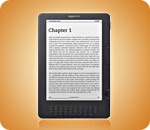
Amazon Kindle DX product review: Why it will change the way you read books
 Sunday, September 26, 2010 Sunday, September 26, 2010by Mike Adams, the Health Ranger Editor of NaturalNews.com (See all articles...) Tags: Amazon kindle, review, health news |
- Newly released JFK files reveal Pentagon's role in creating Lyme disease and covid in the same lab
- DEADLY DECEPTION: How COVID vaccines increased mortality rates and why authorities hid the truth
- CDC finally halts $11 billion COVID funding scam as health officials admit the ‘pandemic’ was a fraud
- The hidden dangers in your kitchen: How cooking methods impact diabetes, cancer and aging
- GAIN-OF-FUNCTION CAT-BIRD-FLU now on the rise as nearly a dozen cats in Colorado "test positive" for Bird Flu due to contaminated cat food
- Trump's greatest betrayal so far: Accelerating Middle East wars, silencing dissent, and serving Zionist masters
- Here are TEN all-natural ways to protect your garden without using harmful chemicals
- Why you should think twice before buying mainstream toothpaste formulas
- ATTENTION PRESIDENT TRUMP: Please WITHDRAW your nomination of Dr. Susan Monarez for CDC Director as she is a VAX FANATIC and TOXIC JAB ZEALOT
- Was JFK's assassination orchestrated by a CIA double agent? New evidence points to James Angleton as the “architect”
- Ginseng's hidden anti-aging power: How compound K is rewriting the rules of skincare
- Home gardening for preppers: A beginner's guide to growing your own food
- “Endgame: The Hidden Agenda 21” unveils a world of conspiracy and control
- Record honeybee deaths devastate U.S. agriculture, pesticides under scrutiny
- Paper or plastic? The environmental deception behind bag bans
- Senate Democrats deny censorship industrial complex existed, defend government's role in silencing dissent
- Lab leak confirmed? Boris Johnson's stunning reversal on COVID origins sparks global debate
- Speaker Johnson warns Congress may defund or disband rogue courts targeting Trump
- Newly released JFK files reveal Pentagon's role in creating Lyme disease and covid in the same lab
- Elon Musk: Aliens could be here on Earth RIGHT NOW
- Festive flavors: The sweet history, nutritional profile and health benefits of pecan pie
- Trump reverses course on Gaza plan, says “nobody is expelling Palestinians”
- Reclaim your health: How midlife exercise reverses years of inactivity
- Big Pharma's $8 Billion bribery scheme exposed: how doctors are pushed to prescribe junk science, not heal
- Boys are back in town: Trump’s patriotic alpha crew takes the wheel while toxic females ride in the backseat
- EPA advisor admits the agency is funneling billions to climate groups ahead of Trump’s return to White House
- Space war brewing? Russia threatens to destroy Starlink satellites
- Survival 101: Effective EMF blocking techniques
- A lack of integrity in Academia: Harvard professor found GUILTY of fraudulent research to promote CRT theory
- Mike Adams Sermon 66: God will DESTROY ISRAEL for its wickedness
- 5 Simple steps to boost your brainpower: How to strengthen executive function in a distracted world
- Rep. Nancy Mace introduces bill to ban biological males from female facilities on federal property
- Sugarcane extract superior to cholesterol-lowering drugs?
- WHO focusing more on policing speech about public health and implementing global surveillance systems
- Pilots report mysterious lights 'moving at extreme speeds' across Oregon skies
- Dr. Mike Yeadon releases 15-minute testimony - WATCH - about genocidal intent of COVID “vaccines”
- EPA advisor admits the agency is funneling billions to climate groups ahead of Trump’s return to White House
- The Health Ranger releases “Vaccine Zombie” song and music video, using AI-animated zombies for the music video
- California's social media censorship law struck down: A victory for free speech or a threat to online safety?
- Dr. Mike Yeadon releases 15-minute testimony - WATCH - about genocidal intent of COVID “vaccines”
- The pandemic as a tool for INDOCTRINATION: Understanding “The Indoctrinated Brain” by Dr. Michael Nehls
- Florida takes a stand: DeSantis proposes permanent ban on mRNA vaccine mandates
- Mike Adams releases country western hit single: Goin’ Back in Time is Comin’ Home
- Mike Adams releases music poetry sensation: A Child of God
- “Why we influenced the 2020 elections”: Facebook files reveal the coordinated effort to bury the Hunter Biden laptop story
- RFK Jr. clears key hurdle: Sen. Susan Collins backs controversial HHS nominee, signaling a new era for health policy
- Unpacking the Lies That We’ve Been Fed – new song and music video released by Mike Adams, the Health Ranger
- Mike Adams releases new song and music video: Nothing More Disgusting Than a Globalist
- Newly released JFK files reveal Pentagon's role in creating Lyme disease and covid in the same lab
- Congratulations to the FULLY UNVACCINATED as you resisted the COVID-19 PROPAGANDA MACHINE fueled by over $100 BILLION
- Michigan sheriff announces criminal investigation into 2020 election crimes, Dominion Voting Systems
- Israeli soldiers accused of even more torture and abuse in the West Bank
- Migrants are taking advantage of recent hurricanes to scam residents and loot their homes
- House Intelligence Committee calls for the ARREST and PROSECUTION of Dr. Anthony Fauci
- Red Cross issues warning to stop blood plasma donations from vaccinated people
- Scientists confirm: GENIUS brain function can be spontaneously unleashed in humans without any apparent cause
- EPA advisor admits the agency is funneling billions to climate groups ahead of Trump’s return to White House
- HYSSOP: What research reveals about the health benefits of this ancient holy herb
- Two containers with completed ballots fall out of truck in Florida
- Fully vaccinated about to see “tsunami” of illness and death, warns virologist
- Global leaders unite to clamp down on “misinformation” with UN-backed Cascais Declaration
- BREAKING: 2025 NDAA authorizes mandatory military draft of WOMEN across America… as Pentagon pursues global NUCLEAR war with both Russia and China at the same time
- Michael Yon warns of a ZIONIST TAKEOVER in Trump’s second administration
- BOMBSHELL: DNA testing kits are a SCAM to develop ethnic-specific bioweapons
- Ozempic and Wegovy weight loss drugs are injectable LIZARD VENOM PEPTIDES that may unleash a devastating wave of organ failure… side effects align with symptoms of SNAKE BITES
- Israeli soldiers accused of even more torture and abuse in the West Bank
- These 13 countries just signed an agreement to engineer a global FAMINE by destroying food supply
- NASA admits that climate change occurs because of changes in Earth’s solar orbit, and NOT because of SUVs and fossil fuels
- RFK Jr. clears key hurdle: Sen. Susan Collins backs controversial HHS nominee, signaling a new era for health policy
- Sermon 30: How Jesus reveals Caesar’s FAKE CURRENCY and FALSE AUTHORITY
- Coriander seeds: Ancient medicine backed by modern science
- Arizona officials claim Maricopa County needs 10-13 days to tabulate results of the election
The emergence of mass-printed physical books transformed the world from an age of ignorance into an age of... well... disinformation if you read conventional history books. But that's beside the point. With the power of the printing press, the mass replication of books put reading material into the hands of virtually all first world citizens. And this resulted in a ripple effect of knowledge expansion while making "entertainment reading" available to citizens of the world for the first time. This, in turn, gave rise to fiction, science fiction, poetry, and even (gosh!) romance novels.
But physical books, as useful as they truly are, still suffer from several significant drawbacks: They're heavy, they grow mold in damp climates, they wear out, and -- here's the worst part -- you can't hold the book and turn the pages using just one hand if you're lying down and reading in bed, or on the beach, or wherever you want to read.
It is for this "page turning" reason that my own reading of books dropped off sharply over the last couple of years. Several years ago, I had read over 600 books on health and nutrition, but in the last two years, I had only read a dozen or so.
Why was this happening? It turned out that at times when I suddenly found myself with time for reading, I didn't have any books around. These are times like waiting in line somewhere, or sitting in a hotel room when traveling for events, etc. Sometimes I would actually drive out to the nearest book retailer and buy a couple of books just for the weekend.
Another problem was that I wanted to read at the gym, on a cardio machine without having to hold the book with both hands. This is impossible with a physical book, but with the Amazon Kindle DX, it's easy. You only have to click one button to turn the page, but aside from that, it's totally hands free.
Solving six big problems all at once
The Amazon Kindle DX solves six big problems with physical books, it turns out:• Problem #1) Carrying them around with you. The Amazon Kindle allows you to carry as many as 3,000 books at once, all inside an object that's about the size and weight of a clipboard.
• Problem #2) Waiting for them to arrive after ordering them. I've been a long-time customer of Amazon.com and have probably purchased quite literally over a thousand books there (not an exaggeration). But even with Amazon's PRIME shipping option, you still have to wait two days to get your book.
But with the Kindle, your book arrives in about 60 seconds over their "whisper" network which uses cell phone technology to grab your book. The amazing thing about this is that it requires no setup, no configuration, no fees, and no effort on your part. It's like magic, really: You buy the book online, and *poof!* The book magically appears on your Amazon Kindle a minute later, with zero effort on your part.
It's beyond streamlined. This book delivery technology works so well that you don't even know it's there. And that's the point, actually. Great technology is technology that gets out of the way and allows you to accomplish what you want without thinking about how it works or having to fiddle with it.
• Problem #3) Holding the pages open. I already mentioned this earlier: Physical books require you to hold them open with two hands (usually). The Kindle can be read hands-free.
• Problem #4) Storing and finding your books. Do you have a massive library of books in your house like I do? Have you ever failed to find a book you wanted to read because your collection is just too large? I've had that problem. The Kindle solves that problem instantly. All your books are on one device, and you can flip through your inventory in seconds to find the book you want.
• Problem #5) Bookmarking. Do you like to read ten books at once, a little at a time? I do that. I'll read a chapter here, a chapter there, and I'll jump around from one book to another. But this creates a problem: Where did I leave off on each book? The Kindle automatically remembers your last-read page in each book, so you can pick up right where you left off with every single book in your collection. It's simple but brilliant.
• Problem #6) Trying before you buy. Did you ever spend good money on a book from Amazon.com and then, after you received it, you discovered it wasn't that good after all? With the Kindle, you can try before you buy by downloading a free sample of most books. Typically you'll get the first chapter, which you can read to make your decision on whether you want to buy the rest of the book. It's yet another small but brilliant improvement in the way we decide what books to buy. I've used it regularly on my Kindle.
Those are six significant problems with books that are solved by the Amazon Kindle. These are hugely important issues to most people who read a lot of books, and I think these reasons are primarily why Amazon has hit a home run with its Kindle technology.
The downside of Kindle
Now, I'm the first to admit not everything is perfect with the Kindle. Amazon has hit a few hiccups such as that time when the company remotely deleted copies of the book "1984" from customer's Kindle devices due to a licensing mix-up.I even wrote an article calling for a boycott of DRM technologies and joining with librarians who are taking a stand against copy-protected intellectual property. This is one reason why I didn't buy a Kindle until recently.
That all happened in 2009. In the time since, Amazon has learned from its mistakes, apologized to its users and put in place new guidelines to prevent such mistakes from happening again. The company seems to be on the right track, doing the right things with Kindle and making the device more open. For example, this may not be widely known, but I've tested it, and the Kindle can read TXT files, too. I have a lot of books as text files that I'm reading on Kindle that way, too (but I prefer to just buy books from the Amazon stores because they're formatted better).
Another problem with Kindle books is that some of the OCR is really sloppy. OCR stands for "Optical Character Recognition," and this is the process by which physical books are converted into digital files if the publisher doesn't provide the original manuscript text in a digital format.
To "OCR" a book, you basically chop off the binding and run it through a scanner then process the whole thing with OCR software that produces a text file.
This seems like an easy process but it's far more complicated than you might suspect. All the hyphenation throughout the book, for example, must be manually removed after the OCR processing. Also, superscripts sometimes get "flattened" which can cause huge problems in books of a scientific nature.
For example, I was recently reading a scientific text about cosmology (the study of the structure of the universe) when I kept noticing the author referring to really small numbers as being "huge beyond imagination!" A line might say something like "10117 is such a huge number that we can't even begin to comprehend it."
And I was thinking, well gee, it's not that much larger than ten thousand. How hard could it be to comprehend 10,117?
You may have guessed what I eventually did, which is that this number was originally 10 to the power of 117 or written like this in line notation: 10 ^ 117. This is quite a ways off from 10,117 which is only about 10 ^ 4.
Clearly, Amazon needs improved quality control on its OCR efforts, but it's a huge task, and I'm sure they're doing the best they can to make things better.
A third potential drawback to Kindle books is that you are essentially tied in to Kindle devices or other Amazon-provided readers that run on your PC, Mac or various mobile devices. I don't really see this as a huge limitation, but it's something to consider. If Amazon.com ever went out of business some day (which seems entirely unlikely anytime soon as it's one of the most successful retailers in the world), you might not be able to access your online library. In such a remote scenario, however, your Kindle would still work just fine and you'd be able to read all the books that were already on it.
Is the Kindle easy on your eyes?
If you've never read a book on a Kindle, you might suspect the reading display would be difficult for your eyes. Reading a book on a laptop or a mobile device, after all, is less than perfect.But thanks to e-Ink technology, the pages on the Kindle actually look brighter in bright light or even direct sunlight. I find that the Kindle is easier to read than a physical book! Plus, you can change the font size on the fly and choose a larger or smaller font depending on what you prefer. This is a very big deal for those with less-than-perfect vision who need larger font sizes. (I've been blessed with perfect vision and don't use glasses or contacts, but even then, I don't like really tiny text fonts.)
The battery life of the Kindle, by the way, is quite impressive. If you turn off the wireless on the device, it can last weeks on a single charge. Turning on the wireless connection saps the batteries in as little as a couple of days, however, so I only turn it on when I need to download a new book.
Environmental aspects
There are still some questions I have about the manufacturing of the Kindle: Is it compliant with RoHS? That's the global standard for reduction of hazardous substances. I did a little research on this and from the best I could find, the Kindle's internal memory is lead-free and RoHS compliant, but I couldn't determine a similar status for the rest of the components.On the environmental side, the Kindle is arguably a net reducer of industrial pollution simply due to the fact that buying books using bits and bytes is more eco-friendly than buying physical books made by printing toxic ink on dead trees. (And then shipping them around the country by burning fossil fuels.) So even if the Kindle isn't 100% green and clean on the inside, it is almost certainly contributing a net benefit to the environment simply by the physical book-buying behavior it allows users to avoid.
Five stars from the Health Ranger
In conclusion, I give the Amazon Kindle DX a rare five-star rating from the Health Ranger. This is a rating I don't think I've ever given to an electronic device.I don't give this lightly, and I only decided to write this after using the Kindle for several months to see how it would impact my life. For me, this device:
• Makes reading easier.
• Allows me to read at more times in more places.
• Allows me to carry hundreds of books anywhere.
• Allows me to buy almost any book I want in sixty seconds.
... and above all, it resulted in me reading and enjoying more books on a regular basis. I've read fiction, scientific books, health books and much more on the Kindle, and it has become an essential item that I won't leave home without.
Here's a link to the exact same Amazon Kindle DX that I bought in July: http://www.amazon.com/Kindle-DX-Wireless-Rea...
(I don't earn anything off this link.)
Enjoy more reading!
Amazon kindle at FETCH.news
Get independent news alerts on natural cures, food lab tests, cannabis medicine, science, robotics, drones, privacy and more.
 About the author:Mike Adams (aka the "Health Ranger") is a best selling author (#1 best selling science book on Amazon.com) and a globally recognized scientific researcher in clean foods. He serves as the founding editor of NaturalNews.com and the lab science director of an internationally accredited (ISO 17025) analytical laboratory known as CWC Labs. There, he was awarded a Certificate of Excellence for achieving extremely high accuracy in the analysis of toxic elements in unknown water samples using ICP-MS instrumentation. Adams is also highly proficient in running liquid chromatography, ion chromatography and mass spectrometry time-of-flight analytical instrumentation.
About the author:Mike Adams (aka the "Health Ranger") is a best selling author (#1 best selling science book on Amazon.com) and a globally recognized scientific researcher in clean foods. He serves as the founding editor of NaturalNews.com and the lab science director of an internationally accredited (ISO 17025) analytical laboratory known as CWC Labs. There, he was awarded a Certificate of Excellence for achieving extremely high accuracy in the analysis of toxic elements in unknown water samples using ICP-MS instrumentation. Adams is also highly proficient in running liquid chromatography, ion chromatography and mass spectrometry time-of-flight analytical instrumentation.
Adams is a person of color whose ancestors include Africans and Native American Indians. He's also of Native American heritage, which he credits as inspiring his "Health Ranger" passion for protecting life and nature against the destruction caused by chemicals, heavy metals and other forms of pollution.
Adams is the founder and publisher of the open source science journal Natural Science Journal, the author of numerous peer-reviewed science papers published by the journal, and the author of the world's first book that published ICP-MS heavy metals analysis results for foods, dietary supplements, pet food, spices and fast food. The book is entitled Food Forensics and is published by BenBella Books.
In his laboratory research, Adams has made numerous food safety breakthroughs such as revealing rice protein products imported from Asia to be contaminated with toxic heavy metals like lead, cadmium and tungsten. Adams was the first food science researcher to document high levels of tungsten in superfoods. He also discovered over 11 ppm lead in imported mangosteen powder, and led an industry-wide voluntary agreement to limit heavy metals in rice protein products.
In addition to his lab work, Adams is also the (non-paid) executive director of the non-profit Consumer Wellness Center (CWC), an organization that redirects 100% of its donations receipts to grant programs that teach children and women how to grow their own food or vastly improve their nutrition. Through the non-profit CWC, Adams also launched Nutrition Rescue, a program that donates essential vitamins to people in need. Click here to see some of the CWC success stories.
With a background in science and software technology, Adams is the original founder of the email newsletter technology company known as Arial Software. Using his technical experience combined with his love for natural health, Adams developed and deployed the content management system currently driving NaturalNews.com. He also engineered the high-level statistical algorithms that power SCIENCE.naturalnews.com, a massive research resource featuring over 10 million scientific studies.
Adams is well known for his incredibly popular consumer activism video blowing the lid on fake blueberries used throughout the food supply. He has also exposed "strange fibers" found in Chicken McNuggets, fake academic credentials of so-called health "gurus," dangerous "detox" products imported as battery acid and sold for oral consumption, fake acai berry scams, the California raw milk raids, the vaccine research fraud revealed by industry whistleblowers and many other topics.
Adams has also helped defend the rights of home gardeners and protect the medical freedom rights of parents. Adams is widely recognized to have made a remarkable global impact on issues like GMOs, vaccines, nutrition therapies, human consciousness.
In addition to his activism, Adams is an accomplished musician who has released over a dozen popular songs covering a variety of activism topics.
Click here to read a more detailed bio on Mike Adams, the Health Ranger, at HealthRanger.com.
Take Action: Support Natural News by linking to this article from your website
Permalink to this article:
Embed article link: (copy HTML code below):
Reprinting this article:
Non-commercial use OK, cite NaturalNews.com with clickable link.
Follow Natural News on Facebook, Twitter, Google Plus, and Pinterest
Science News & Studies
Medicine News and Information
Food News & Studies
Health News & Studies
Herbs News & Information
Pollution News & Studies
Cancer News & Studies
Climate News & Studies
Survival News & Information
Gear News & Information
News covering technology, stocks, hackers, and more



"Big Tech and mainstream media are constantly trying to silence the independent voices that dare to bring you the truth about toxic food ingredients, dangerous medications and the failed, fraudulent science of the profit-driven medical establishment.
Email is one of the best ways to make sure you stay informed, without the censorship of the tech giants (Google, Apple, Facebook, Twitter, YouTube, etc.). Stay informed and you'll even likely learn information that may help save your own life."
–The Health Ranger, Mike Adams













































